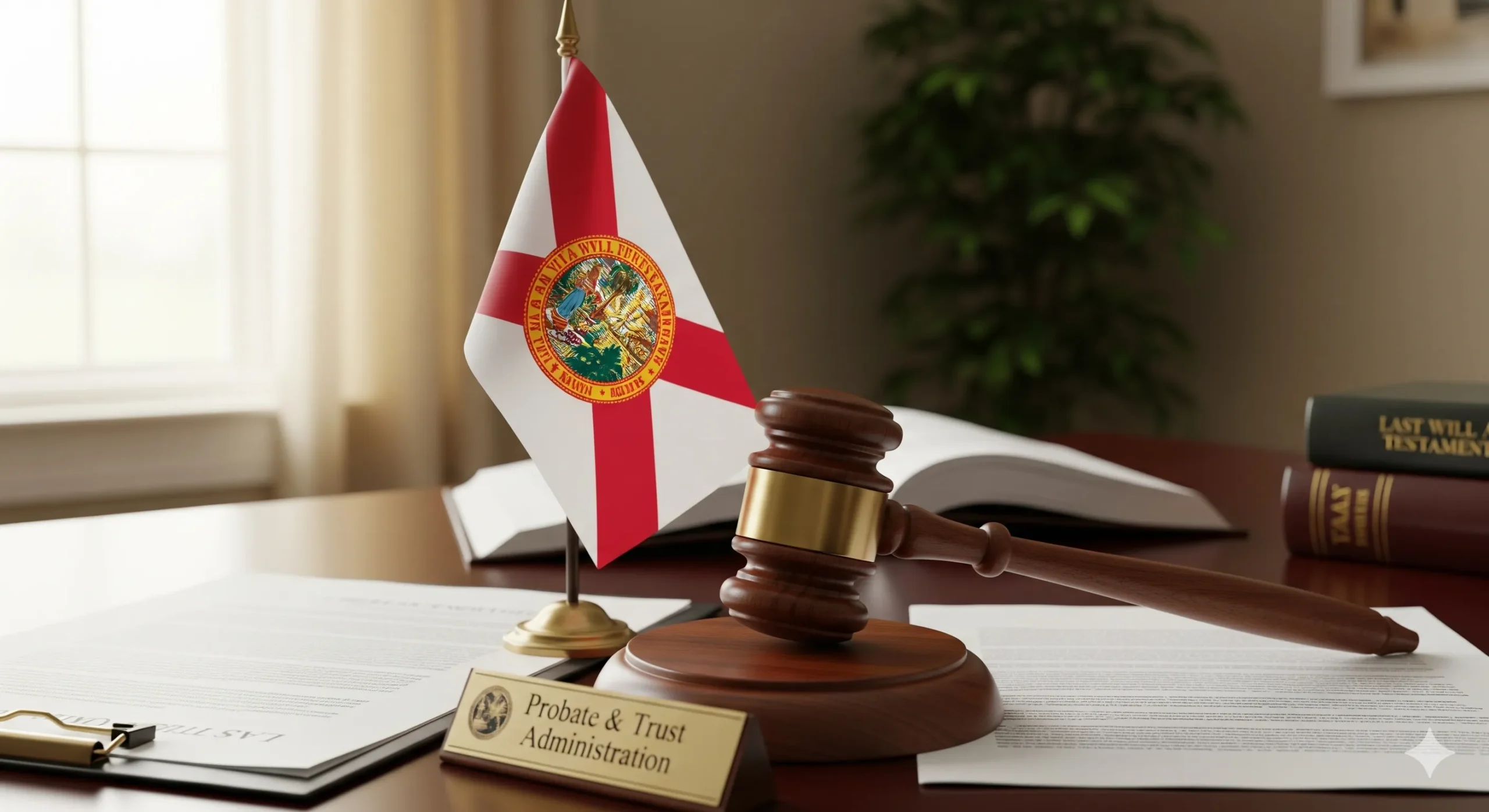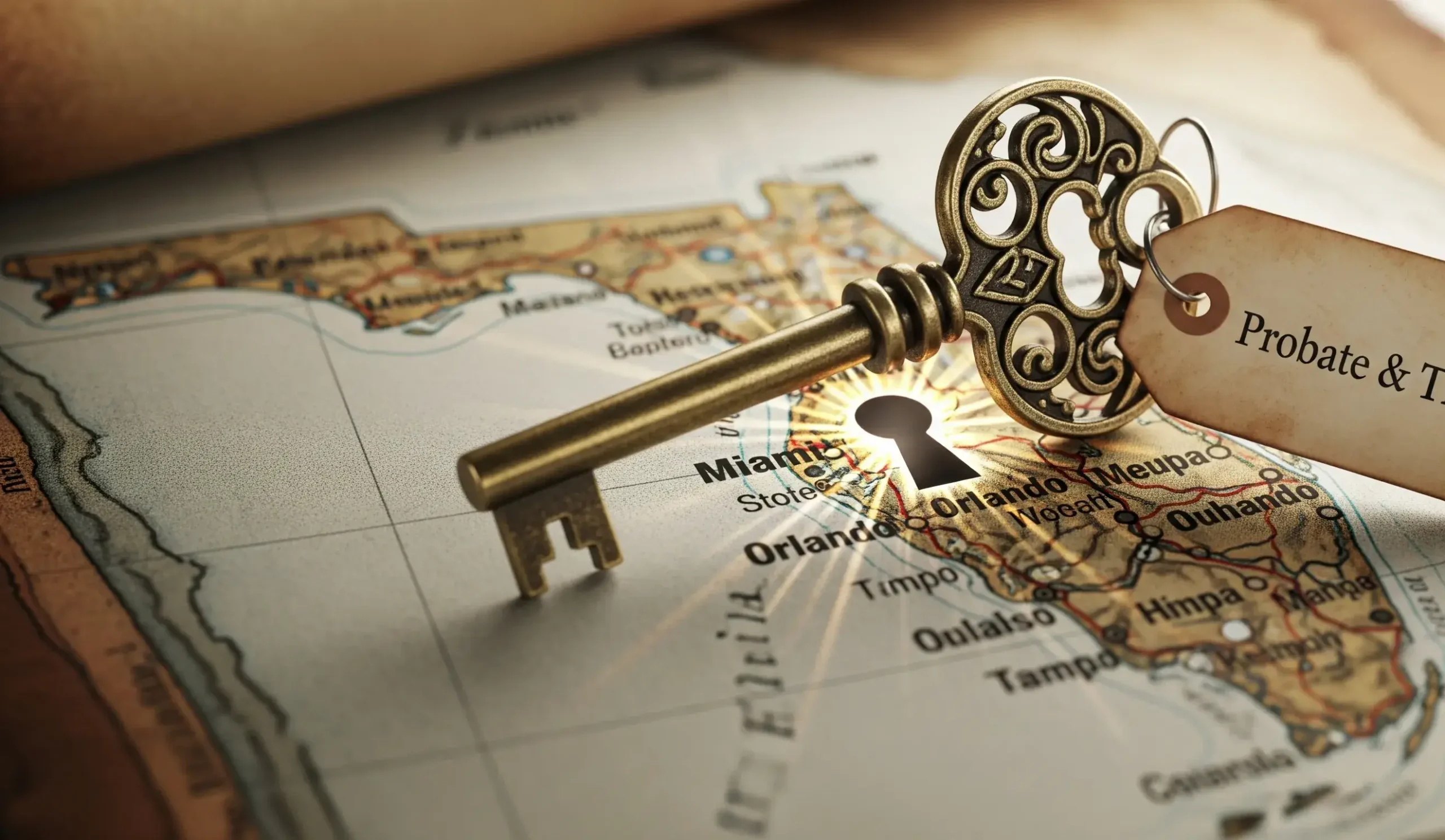Florida Probate & Trust Administration
Step-by-Step Guidance for Families, Executors & Trustees
Losing someone is never easy. The legal and financial aftermath shouldn’t make things harder. At Smith Will & Trust, we guide families through Florida probate and trust administration from start to finish—explaining every step in plain English, keeping deadlines on track, and helping you fulfill your legal duties with confidence.
As part of our comprehensive Estate Planning & Trust Services, we help clients throughout Tampa, Brandon, Riverview, and SouthShore navigate probate efficiently and avoid costly mistakes that can lead to disputes or delays.
Whether you’re serving as a personal representative, executor, or trustee, our attorneys provide clear direction and responsive support every step of the way.
For more information about Florida’s probate process, visit the official Florida Courts Probate Resources page.
What Probate Really Is (and Why It Exists)
Probate is Florida’s court-supervised process for identifying a decedent’s assets, paying valid debts, and distributing what’s left to the rightful beneficiaries. Even though the term “probate” can sound intimidating, it exists to protect families and creditors, ensure proper notice, and confirm that assets pass to the right people.
Florida recognizes two main types:
- Summary Administration: A simplified, faster process available when the estate’s value is $75,000 or less (excluding exempt property) or the decedent has been deceased for over two years. This option avoids the appointment of a personal representative and can often be completed in a few months.
- Formal Administration: The full, traditional process, required for most estates over $75,000 or where creditor claims or disputes are expected. Formal administration includes appointment of a personal representative, formal inventories, and ongoing court oversight until the estate is closed.
Many probate filings become part of the public record, but Florida protects sensitive financial information by keeping inventories and accountings confidential—accessible only to interested parties.

Why Choosing the Right Path Matters
Our first job is determining which process applies. Using your loved one’s will, asset list, and death certificate, we identify whether summary administration, formal administration, or a combination is appropriate. Choosing the right route can save significant time and expense, for example, filing summary administration when eligible can cut months off the process and reduce attorney’s fees.
Because probate is closely tied to your overall estate plan, we coordinate each case as part of our broader Estate Planning & Trust Services. If there are jointly titled assets, payable-on-death accounts, or beneficiary designations, we ensure they pass outside probate whenever allowed under Florida law, simplifying the transfer process for your family.
Understanding the Florida Probate Timeline
Florida probate law is deadline-driven. Missing a step can delay distribution or create liability for the personal representative.
Key timelines we track for you include:
- Notice to Creditors: Must be published and served promptly to start the creditor claim period.
- Creditor Claim Period: Most claims must be filed within three months of first publication or they are barred.
- Homestead Determinations: Filed to establish the status of Florida homestead property and protect it from certain claims.
- Final Accountings: Submitted before distribution to provide beneficiaries with a clear record of estate assets and expenses.
Our team handles calendaring, notices, and filings so you don’t have to worry about missed deadlines.
When Ancillary Probate Is Required
If the decedent lived in another state but owned Florida property (such as a condo, vacation home, or land), ancillary probate may be required here to transfer or sell the property. Conversely, if your loved one was a Florida resident with property elsewhere, we coordinate with out-of-state counsel to handle the entire process efficiently.
Ancillary administration can seem daunting, but we guide you through each step—filing the appropriate petitions, notifying interested parties, and securing a Florida court order that allows proper transfer or sale.
Trust Administration – Duties for Florida Trustees
If your loved one had a revocable living trust, you may avoid probate for the assets properly titled to the trust. But trust administration still involves important legal and fiduciary duties.
Trustees must:
- Follow the trust’s written terms exactly.
- Keep qualified beneficiaries reasonably informed of significant actions.
- Provide required accountings under the Florida Trust Code.
- Act prudently when selling, investing, or distributing trust assets.
We provide practical tools—checklists, communication templates, and accounting guides—so you can perform these duties confidently and reduce the risk of disputes or lawsuits from unhappy beneficiaries.
Your Role, Step by Step
Our process makes probate and trust administration as smooth as possible:

Initial Consultation & Document Intake :
We review the will, trust, death certificate, asset statements, and deeds.

Plan the Pathway :
Decide whether summary, formal, or trust-only administration applies, and design a timeline.

Court Filings & Notices :
File petitions, obtain Letters of Administration, publish and serve notice to creditors, and resolve homestead issues.

Asset Marshaling :
Secure property, retitle accounts, and collect estate assets so they’re ready for distribution.

Claims & Expenses :
Validate creditor claims, pay debts and expenses, and object to improper or late-filed claims under Chapter 733.

Accounting & Beneficiary Communications :
Prepare interim and final accountings, keeping beneficiaries informed throughout.

Final Distribution & Closing :
Distribute remaining assets according to the will or trust and close the estate or trust with the court.

Common Situations That Need Quick Action
When Fast Action Matters
Some probate and trust administration cases require immediate attention to prevent serious issues:
-
You’ve received a deadline letter from the court or a creditor.
-
Real estate needs to be sold quickly to prevent foreclosure, tax problems, or loss of value.
-
Family conflict is escalating and may require mediation before it turns into litigation.
-
Assets are spread across multiple states and need coordinated legal handling.
By contacting us early, our attorneys can preserve rights, protect estate property, and keep the administration process on schedule. As part of our broader Estate Planning & Trust Services, we work proactively to resolve time-sensitive issues before they become costly disputes.
Where We Meet You
Proudly serving Tampa, Brandon, Riverview, and SouthShore with trusted estate planning and probate guidance you can count on.
- Smith Will & Trust: 4830 W. Kennedy Blvd., Suite 600, Tampa, FL 33609
Education & Resources
We believe an informed client is an empowered client. That’s why we take the time to explain how each part of your Estate Planning & Trust Services works together, from estate planning and trust planning to probate and trust administration and business law coordination.
For background reading, we recommend two reliable Florida legal resources: the Florida Courts Help website and The Florida Bar’s Probate Pamphlet. These offer a helpful overview of probate and estate law in Florida, but your circumstances are unique; we tailor every plan to your goals, family structure, and property holdings.

FAQs
How long does Florida probate take?
Summary cases can resolve in a few months. Formal administration typically takes longer – often 6 – 12 months because of notice periods, creditor windows, and court approvals.
Do we need probate if there’s a trust?
Not necessarily. Properly funded trust assets avoid probate, but anything left outside the trust may still require probate through a pour-over will.
Are probate records public?
Yes, most filings are public, but inventories and accountings are confidential to protect privacy.
What if the decedent owned property in Florida but lived elsewhere?
You’ll likely need ancillary probate in Florida to transfer or sell that property.
Ready to Get Started?
The sooner you act, the sooner you can close the estate, protect beneficiaries, and move forward with peace of mind.
